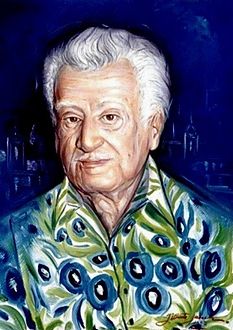
Jorge Amado is one of the pioneers of world literature
Jorge Amado Full name Jorge Amado de Faria (born in Bahia 10 August 1912, 6 August 2001) is a Brazilian journalist, politician and politician, one of Brazil's most famous and famous writers. From the days of the school he began writing, and he and a number of friends in his hometown "Modernism". In 1935, he completed his studies in Rio de Janeiro, but did not receive his degree. He entered the world of literature at the time and began to make his way to success in a collection of works, including the Pais do carnaval, Cacao (1933) , Suor and Jubiaba (1935), followed by Mar Morto and Capitaes Areia (1936). Georges Amadou has become a favorite writer of his people. The secret of this success is his adherence to some forms of the post mixed with gum and the taste of ancient traditions in his hometown, the state of Bahia, which was in its cities and countryside Theater of all his novels, and people permanent heroes.
His career
He joined the Brazilian Communist Party in 1926, but this did not lead to the coloring of his literature in the form of dogmatic literature, except in El Mundo de la Paz (1951) Freedom »Subterrâneos da liberdade, which consists of three huge parts, where the creative power and the ability to draw characters and portray the positions are not hastened to write under the influence of party requirements, but this effect seems less clear in the novel" Knight of Hope "(1942) O cavaleiro de esperanca In which he discussed the life of the Brazilian Communist leader Luis Carlos Prestes, as well as the epic novels Which speaks of the conflict between feudalism and merchants in cocoa-growing areas, as in the novel "Lands of Infinity" (1942) Terras do sem fin.
In 1946 he was elected to Parliament with a large number of votes. However, the military government immediately abolished the Communist Party's legitimacy and had to leave his homeland to live between France, Italy, Czechoslovakia and the Soviet Union. He was only able to return home in 1952. He was awarded the Stalin Prize for Literature and became a member of the Commission. This award, he began translating his books into many languages.
Before 1958, Amado wrote Marxist novels that reflected his sympathy for the victims of social injustice, including the novel The Land of Violence (1942). He then wrote Gabriella, Garlic and Cinnamon (1958) in a more subtle way, relying on the style of the alphabetical humor. Many of the critics are Motta Quincas and Wertrill (1962).
Amado made an important contribution to Brazilian literature, being the first prominent writer to describe the broad African heritage of his nation. This theme has dominated one of his best novel The Miracle Tent (1969 AD). Other accounts include Donna Flor and Zogha (1966); Tita (1978); Joubaiba (1984); Revelation (1987); War of the Saints (1993).
His works
Amadou's work has grown to 40 books, most of which have been translated into more than thirty languages. His translation into Arabic has begun since the mid-1950s, but only half has been translated by the end of the 20th century. Among his most notable works:
"Zorba Brazilian"
«St. George the patron of Elois» (1944) Sao Jorge dos Ileus,
«Gram Soldier» (1947) O amor do soldado,
"The Elderly Sailors" (1961) Os velhos marinheiros,
«Dona Flor and Zogha» (1976) Dona Flor e seus dois maridos,
«Shop of Miracles» (1970) Tenda dos Milagres,
"Theresa Battista Tired of War" (1972) Tereza Batists, cansada de guerra,
Dead Sea, 1,936, translated Dar al - Hilal 1993
Amadou also has several poetry collections, including Aestrela do mar, and an important critique of the well-known anti-slavery Brazilian poet Castro Alves, ABC de Castro Alves.
World
Most of his novels were transferred to television, radio and theater, and Donna Flor was featured in a 1976 film. The television series on Gabriella, Garlic and Cinnamon, was very popular in Latin America, and a copy of the film was made in 1983. 20 million copies of Amado books were sold worldwide after being translated into about 50 languages. Amado won several awards, including the Pablo Neruda Prize (Moscow 1994); the Luis de Camois Prize (Lisbon 1995), the Cinu Del Duca Award (1998).
Source: Wikipedia
Comments
Post a Comment